2022 Annual Report: Adapting to a Changing World
CNFA’s steadfast dedication to our mission once again enabled our organization over the past year as we worked to support farmers, entrepreneurs and their communities around the world. Although a range of challenges threatened to push the world’s most vulnerable populations further into poverty, including the lingering effects of COVID-19, ongoing threats posed by unpredictable weather conditions, and the global consequences of the war in Ukraine, CNFA remained resolute in its commitments to fostering improved circumstances and livelihoods through agriculture.
There has never been a more critical time and need for our activities and the unique expertise we offer to our ever-changing world. Although social and political factors have influenced undernourished and economically challenged populations globally throughout our organization’s existence, we believe the world now faces an unprecedented array of threats.
As we saw last year—and will continue to see in the year ahead—rural agricultural societies where people barely eked out an existence in decades past now increasingly see their lives upended by extended droughts or sudden floods, unseasonable patches of hot or cold weather, influxes of new parasites or diseases and other dangers. These already marginalized populations—now facing starvation and further economic instability—are forced to either compete for ever-dwindling resources or join mass migrations to other stressed regions where they must endeavor simply to survive, often amid growing social and political unrest.
Within the international development community, CNFA has been at the leading edge of efforts to create an approach to agricultural development aimed at addressing these growing challenges. CNFA’s entrepreneur-focused programs incorporate on-the-ground strategies that allow our organization to quickly adapt and propagate agricultural technologies and techniques in response to specific natural conditions, thereby improving agricultural production, preserving access to nourishing foods, increasing economic stability and strengthening food security.
Our Feed the Future programs in Africa are a case in point. The Feed the Future Mali Sugu Yiriwa activity trained over 6,000 Malian producers, agrodealers, processors, breeders and traders in good agricultural practices. In Burkina Faso, the USAID Yidgiri activity established more than 300 demonstration plots between 2020 and 2022. In Niger, the USAID Yalwa activity almost doubled the number of producer organizations it supported, from 384 in 2020 to 658 in 2022. In Rwanda, CNFA completed the Feed the Future Rwanda Hinga Weze activity after working with more than 200,000 farmers, and will continue to support Rwandan communities for another five years through the Feed the Future Rwanda Hinga Wunguke Activity awarded in November 2022.
CNFA-implemented projects drove similar results in other parts of the world too. In Moldova, our USAID-funded Farmer-to-Farmer Program (F2F) helped improve soil health and pave the way for the country to export organic agriculture products to Western Europe. In Georgia, the USAID Agriculture Program facilitated the importation of 72,000 certified virus-free blueberry, raspberry and strawberry plants for local producers, bolstering the value chains at a local level, and the Georgia Hazelnut Improvement Project worked in its final year to ensure the sustainability of its initiatives. In Azerbaijan, the USAID Private Sector Activity organized trade missions to Georgia, Italy and Israel, and facilitated business-to-business linkages between U.S. and Azerbaijani enterprises. Finally, the USDA West Africa PRO-Cashew Project distributed improved cashew rootstock plants across its five target countries, working with the private sector, research institutions, agricultural extension agents and government agencies to reach 372,617 farmers.
CNFA also saw a change in leadership in 2022, with Elin Miller ceding her position as chair of the CNFA Board of Directors. We extend to her our heartfelt thanks for her efforts and look forward to her continuing as a member of the CNFA Board.
In the year ahead, CNFA will continue to adhere to our guiding principles of integrity, expertise and value, and will work to maximize our efforts to improve nutrition, bolster agricultural sufficiency and lift agricultural economies ravaged by war and poverty.
Best regards,
Mike Espy, Chair, CNFA Board of Directors
Sylvain Roy, President & CEO, CNFA

2022 Impact

611,990
individuals participated
in CNFA’s projects

44%
of CNFA’s project
participants were women

32,105
micro, small & medium
enterprises engaged

$98 M
in finance & investments
leveraged

$146 M
in increased revenue
or income generated

2,770
days of volunteer
assistance provided
Spotlight
CNFA Participates in 2022 Norman E. Borlaug International Dialogue
CNFA & Seed Science Center at Iowa State University Announce New Partnership
CNFA’s presence at the World Food Prize Foundation’s 2022 Norman E. Borlaug International Dialogue in Des Moines, Iowa, featured several notable events. On October 19, 2022, Dr. Louisa Namicheishvili, CNFA’s chief of party for the USAID Agriculture Program, was on the panel for the main stage roundtable “Financing and Investments for Climate Action and Food System Transformation.” Joining other experts from the public and private sectors, the group discussed financial mechanisms and investment strategies for improving sustainable, gender-sensitive food systems to support the world’s most vulnerable communities.
CNFA also hosted a side event, under the theme “Rebuilding the Economy through Agriculture,” with discussion from public and private sector panelists on agriculture strategies that accelerate post-crisis rebuilding, drive economic growth and build resilience in the face of challenges. The panel featured Mike Michener, deputy assistant administrator for USAID’s Bureau of Resilience and Food Security, Antonina Broyaka, extension associate in the Department of Agricultural Economics at Kansas State University, David Kirvalidze, former minister of agriculture for Georgia and CNFA Board member, and Jay Vroom, former CEO of CropLife America.
In October 2022, CNFA and the Seed Science Center at Iowa State University signed a memorandum of understanding during the World Food Prize Foundation’s 2022 Norman E. Borlaug International Dialogue to address growing food insecurity and improve the productivity and resilience of global seed supply chains. The agreement between CNFA and the Seed Science Center outlines how the two organizations will combine their complementary strengths in agricultural market systems development and scientific research to improve seed availability, quality and testing around the world. As partners, CNFA and the Seed Science Center will also work to innovate approaches that can address crises quickly and sustainably, while also reducing the effects of disruptions to food production, food distribution and market systems development. The collaboration comes at a critical time as the impacts of conflict and COVID-19 continue straining local and global supply chains and food systems.
CNFA Continues Working to Boost the Rwandan Agriculture Sector
USAID Resilient Communities Program Launched in Georgia
Leveraging the experience and expertise gained under the Feed the Future Rwanda Hinga Weze activity from 2017-2022, CNFA was awarded the $28 million Feed the Future Rwanda Hinga Wunguke Activity in late 2022 to increase incomes and improve nutrition in Rwanda by sustainably increasing agricultural productivity and strengthening the domestic consumption and market for high-value and nutritious agricultural products.
Joined by MarketShare Associates, the new activity aptly named Hinga Wunguke—which translates to “grow profitable” in Kinyarwanda—will work to strengthen farmers’ resilience, while increasing their profitability and access to improved markets, inputs, finance, technologies and agricultural practices. It will also support policies that enable and incentivize private-sector investment and growth, creating economic opportunities that improve food security and nutrition outcomes for rural households.
Drawing on its experience strengthening agricultural production, markets and livelihoods in Georgia since 2006, CNFA launched the five-year, $24 million USAID Resilient Communities Program in July 2022. The Program, which is designed to support households and micro, small and medium enterprises along Georgia’s Administrative Boundary Line (ABL), will build community resilience against shocks and disasters, enhance the inclusion of marginalized and at-risk communities—including women and youth—and stimulate sustainable socio-economic development through catalytic grant investments, private sector engagement and local and national government collaboration. CNFA is implementing the Program with partners Solimar International, a U.S.-based small business experienced in developing Georgia’s tourism industry; the Association Rural Development for Future Georgia, a Georgian nongovernmental organization specialized in community development, disaster risk reduction, economic development and inclusion in the ABL and throughout Georgia; and the Policy and Management Consulting Group, a Georgian consulting firm with expertise in economic analysis, including conducting value chain and niche market analyses.
Highlights from Our Projects
Scaling Up Best Practices for Smallholder Farmers
Assisted local entrepreneurs and producers with resources and best practices that helped them boost their production and grow their activities.
Burkina Faso
Improving Access to Finance for Burkinabè Producers
The Feed the Future-funded USAID Yidgiri activity trained 964 representatives from cowpea cooperatives in the Centre-Nord, Sahel and Est regions of Burkina Faso, of whom the majority were women, on the process of setting up a warrantage, a localized credit system that helps rural producers access finance, with 30 warehouses purposed for this use. The representatives were also trained in organizing group sales and supported with submitting credit application forms to microfinance institutions. These options enabled them to boost their income-generating activities and take advantage of better selling opportunities, ensuring more sustainable livelihoods and a stronger cowpea value chain.
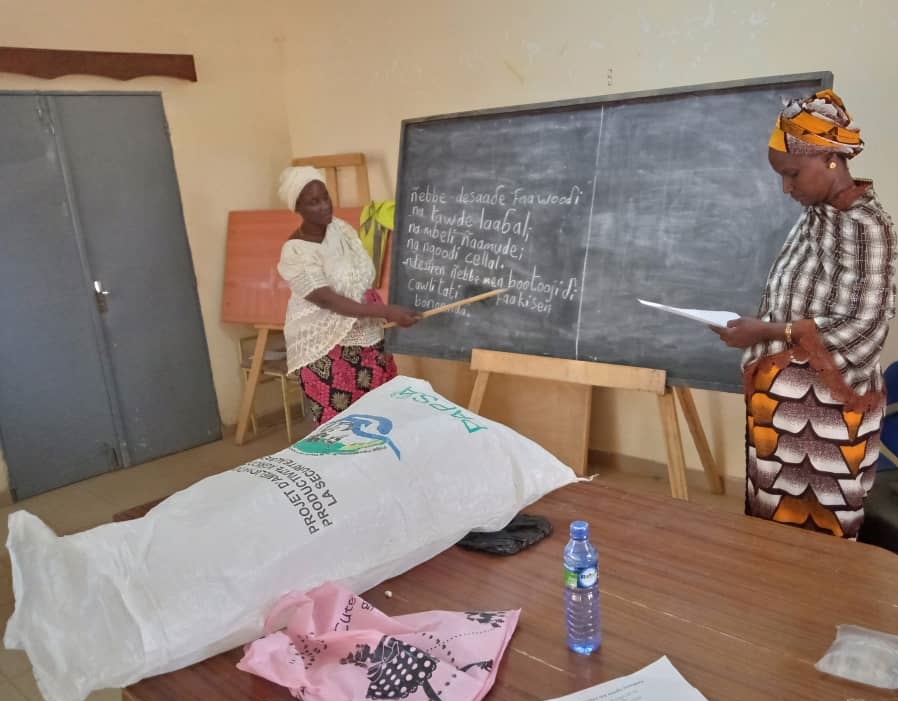
Georgia
Enhancing the Capacity and Reach of Georgian Fruit Nurseries
The USAID Agriculture Program helped Georgian fruit nurseries access key inputs, such as modern, disease-free seed varieties, obtain certifications and strategize operations for business growth. The Program worked with the country’s National Food Agency (NFA) and the Scientific-Research Center of Agriculture to facilitate the exchange of experiences and knowledge among nurseries through study tours to Croatia, the Netherlands and Serbia. These enabled participants to study planting material certification procedures and best practices in both EU member and non-EU member countries, as well as guide the NFA in refining its methodology before introducing mandatory certifications for planting materials. The scope of the Program’s work included working with Franco Zenti, an Italian fruit breeder, to register the Scala strawberry variety in July 2022. Following this registration, Mza Chitili Ltd, a local fruit nursery working with the Program, was able to obtain propagation rights and sell around 30,000 seedlings to local growers.
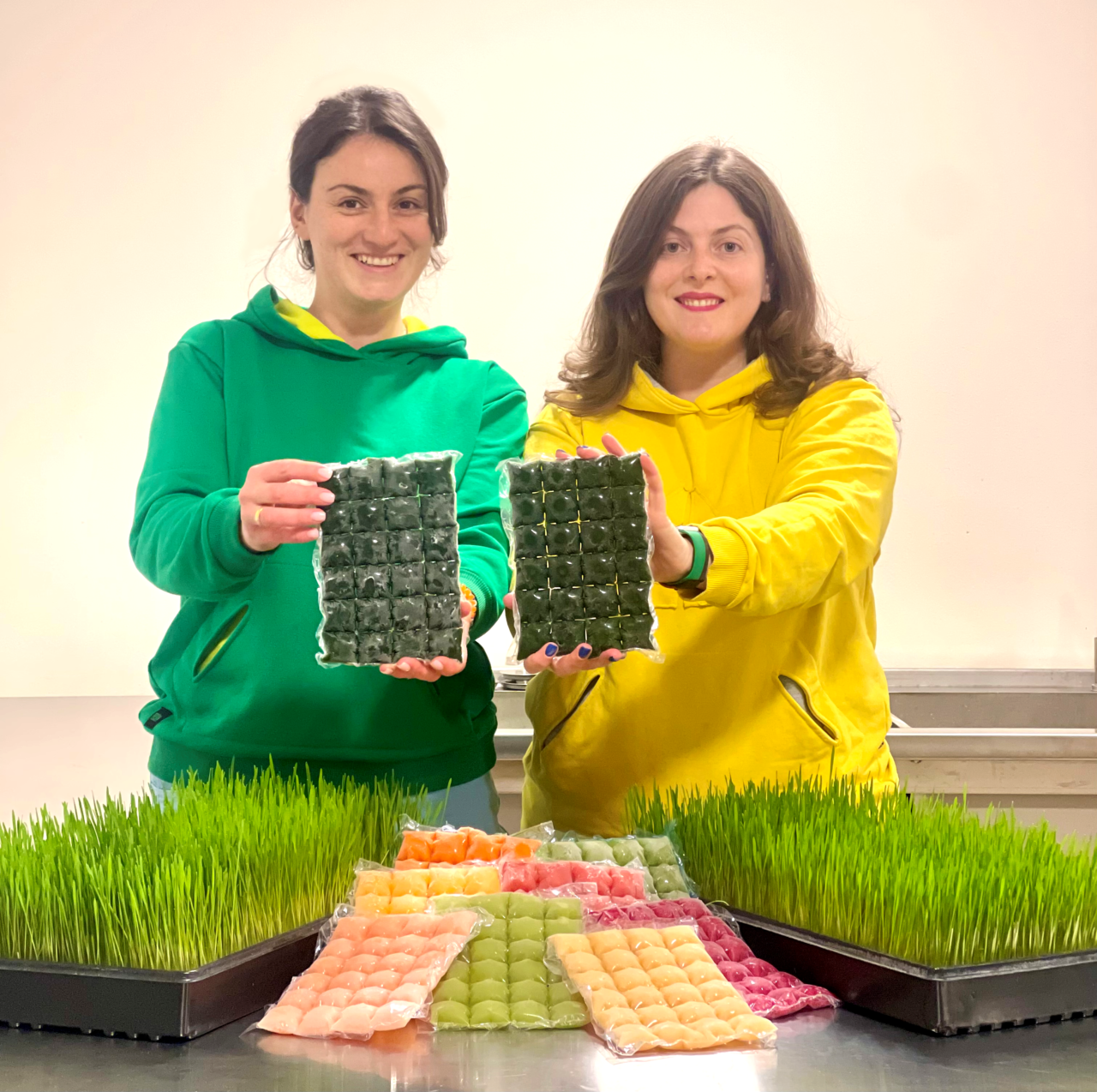
Boosting Agricultural Enabling Spaces
Facilitated inclusive partnerships with key public and private sector actors, improving the landscape for agribusinesses to succeed.
Nigeria
Developing Policies that Enable Nigerian Agribusinesses to Thrive
The USAID Feed the Future Nigeria Agribusiness Investment Activity worked to improve the agribusiness enabling space in Nigeria by supporting the development of policies that enhance agricultural production and increase access to technology, innovation and investment. With a focus on strengthening national and sub-national policy, institutional and regulatory frameworks, the Activity engaged with market system stakeholders to identify challenges affecting them and carry out inclusive reform processes. This resulted in one national plan and three state-level policies and guidelines being approved that notably improve access to finance for agribusinesses. For the national level plan, the Activity served as a Technical Working Committee member to develop the National Agricultural Technology and Innovation Plan (NATIP, 2022-2027), providing technical assistance and logistical support, and supporting with review sessions and then final validation of the policy document. This policy aims to ensure food security across the agricultural sector, generate employment and support services, boost markets and make inputs more readily available.

Azerbaijan
Advancing Women’s Entrepreneurship in Azerbaijan
In Azerbaijan, the USAID Private Sector Activity hosted the Women’s National Business Agenda (WNBA) conference in November 2022 where the group—launched by the Activity in 2021—presented a white paper identifying specific obstacles facing women’s entrepreneurship and employment in the country and solutions to overcome them. The document included detailed recommendations to the government and the private sector on how to support women in entrepreneurship and in the workforce, as well as what gender-sensitive support mechanisms should be considered for implementation. Following the conference, the Activity launched an educational campaign with relevant authorities and stakeholders to promote key priority areas highlighted in the white paper. The campaign included high-level meetings with representatives from the Government of Azerbaijan and the private sector, articles and interviews addressing the WNBA’s objectives and further promotion of the group and white paper on TV networks and social media channels.
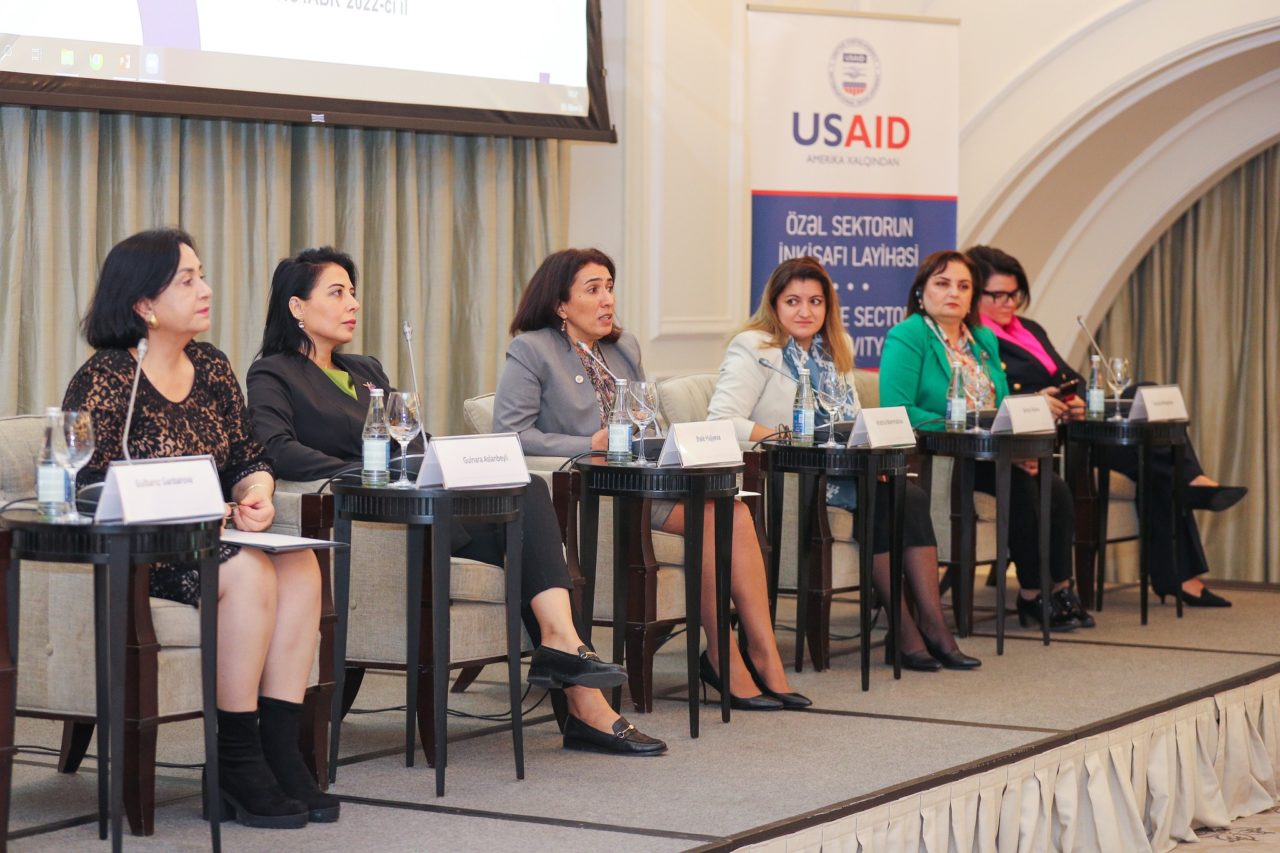
Fostering Resilient Market Systems
Promoted technologies and practices that strengthen agricultural production, market access and incomes for small-scale producers.
Georgia
Building Facilities to Strengthen the Hazelnut Production Process in Georgia
The construction of modern hazelnut husking, drying and storage (HDS) facilities has been a critical focus of the Georgia Hazelnut Improvement Project, providing Georgian farmers with access to the techniques and tools they need to increase the quality and quantity of their hazelnuts, as well as earn higher profits from their harvests. Since the Project’s launch in 2015, seven facilities have initiated activities, and in September 2022, an eighth HDS facility was established. The new facility in the Guria region helps farmers access the likes of hazelnut drying equipment, tractors, hazelnut cleaning machines and electric pallet stackers. Co-financed by Georgia Hazelnut Growers’ Association (GHGA) Commercial Ltd, a GHGA subsidiary, and the Georgian Rural Development Agency, it also helps farmers access modern post-harvest handling infrastructure to better preserve the quality and price of their nuts. All eight HDS facilities are now fully operational and have the overall capacity to dry around 8,000 tons and store 4,000 tons of hazelnuts.
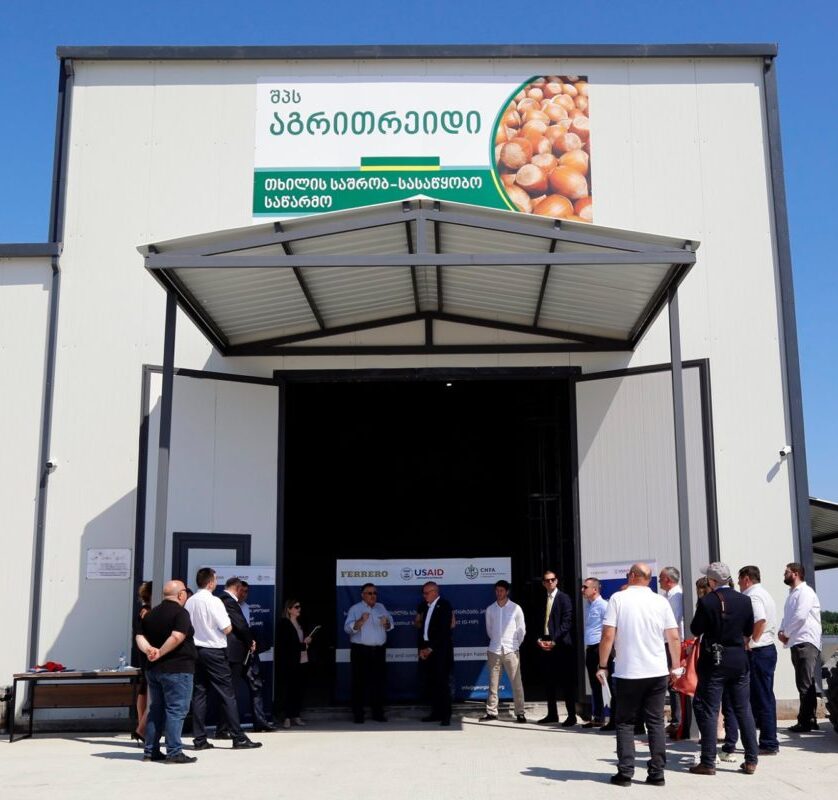
Mali
Diversifying the Malian Agriculture Market to Adapt to Global Shortages
To improve the resilience of Malian farmers and agribusinesses against the impacts of the war in Ukraine, such as a weakened grain supply chain, the USAID Feed the Future Mali Sugu Yiriwa activity worked with project partners to incorporate new value chains into the market. This included the soybean value chain, with the activity helping over 1,350 producer organizations access 100 tons of certified soybean seeds. Soybeans will be able to be produced locally and used for commodities like cooking oil and fodder for animals, which have seen their prices increase, providing affordable options to community members and agribusinesses as they adapt to the ripple effects of the war while fostering more sustainable livelihoods.

Facilitating Improved Food Quality and Productivity
Worked closely with smallholder farmers and communities to develop higher qualities and quantities of food, improving their overall health and livelihoods.
Niger
Promoting a Framework for Nutritious Foods in Niger
In Niger, the Feed the Future-funded USAID Yalwa activity developed training modules to strengthen the technical capacity of 350 producer organizations (POs) to practice safe food handling, improve marketing strategies for nutritious foods and increase the supply of nutritious foods in local markets. Reaching 709 members, of which 65% were women, the training also covered applicable technologies such as utilizing the clay pot cooler—a low-cost and locally available device that effectively stores fruits and vegetables in hot and dry climates. By promoting demand for nutritious foods and fostering increased supply of these foods through initiatives like the training modules, the activity is effectively increasing local consumption and supporting healthier communities. This is expected to spread further with the expansion of the activity’s business cluster approach, which enables POs to better access finance and maximize their sales through strengthened linkages with buyers and financial providers.
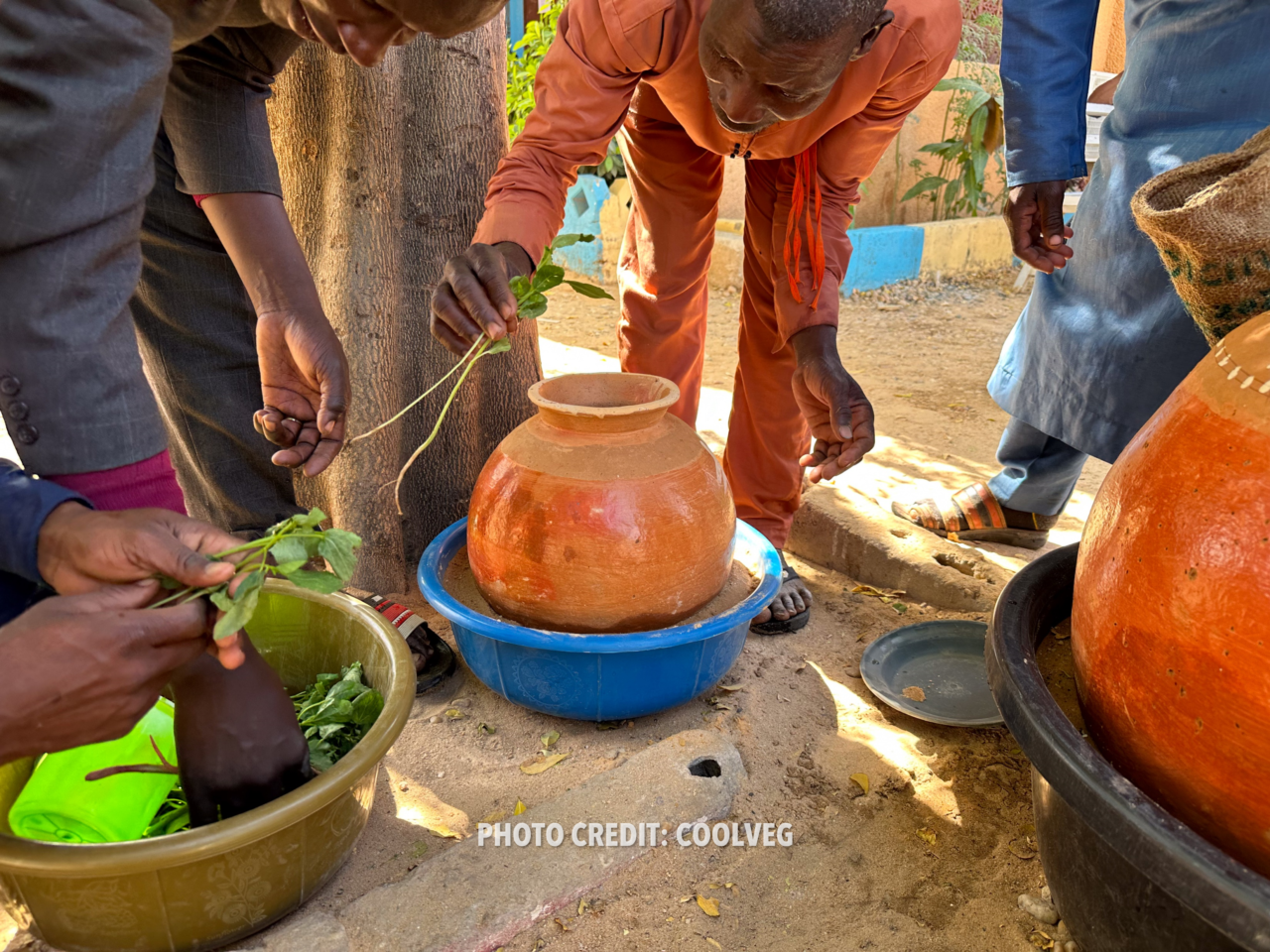
Southern Africa
Partnering with Experts to Implement Best Practices and Technologies
The USAID Farmer-to-Farmer Program (F2F) implemented by CNFA in Southern Africa and Moldova worked closely with Feed the Future Innovation Labs, global agribusinesses and volunteers based in the U.S. and across Southern Africa to disseminate knowledge, promote best practices and introduce technologies that help rural entrepreneurs enhance their productivity and develop a sustainable flow of income. Working with the Soybean Innovation Lab and the American Oil Chemists’ Society, F2F piloted the Processor-to-Processor (P2P) Program, which matches oilseed processing experts with local processors to help optimize their operations and scale up the availability of high-quality, nutritious oilseed products in local markets. This resulted in three initial P2P volunteers supporting three agribusinesses in Malawi and Mozambique to improve the efficiency, safety and development of new products. With the Peanut Innovation Lab, F2F carried out 57 trainings in agronomic practices and aflatoxin management to help improve farmers’ productivity and groundnut quality. Similarly, with the Soybean Innovation Lab, F2F facilitated 41 soybean production trainings to promote the advantages of soybeans, such as producing soybean oil and feeding livestock.
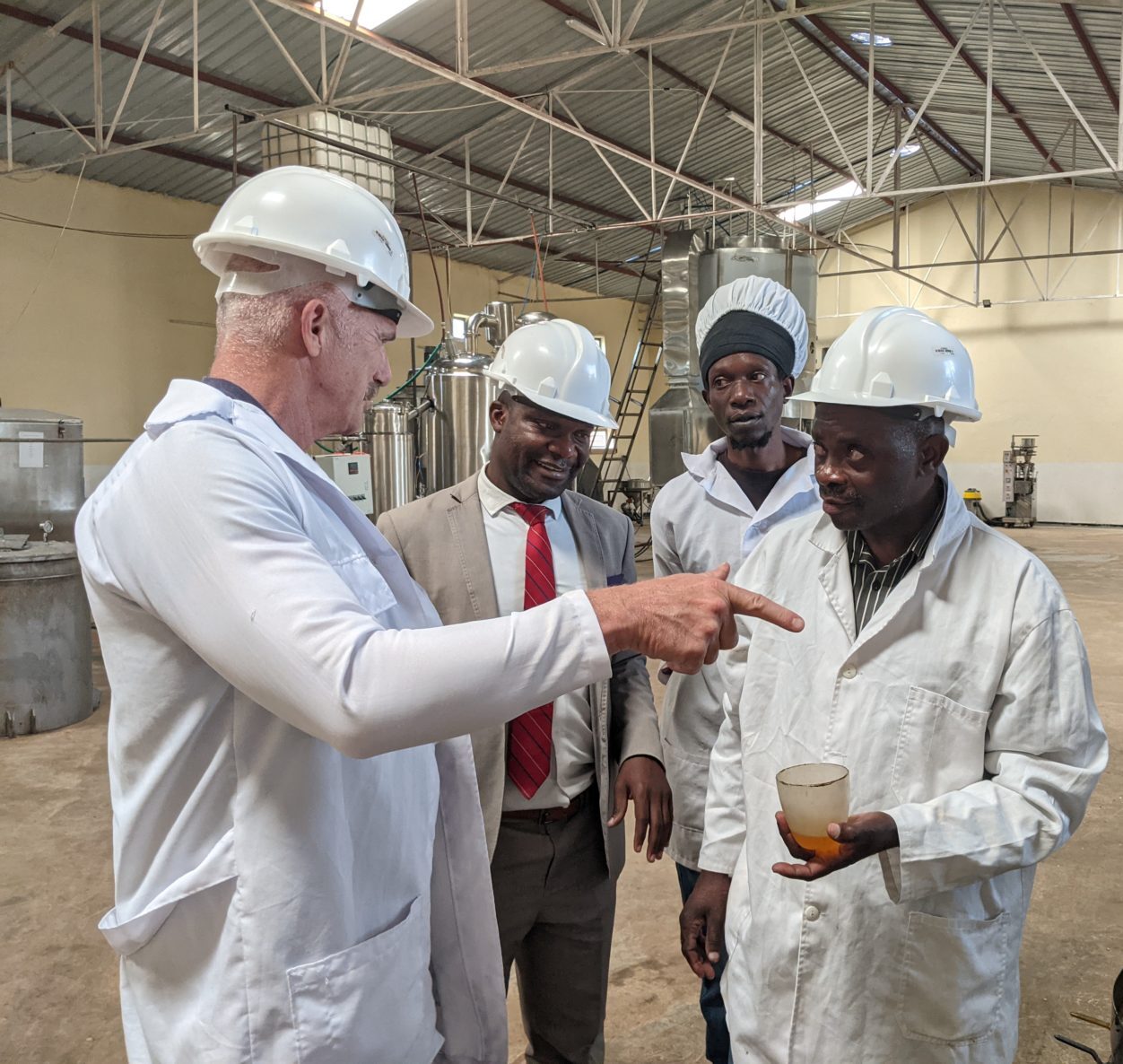
Board of Directors
President and Chief Executive Officer
Chair
Director Emeritus
Board of Directors
Thad W. Simons
Financials
Total Revenue – $63,058,981
Federal & Non-Federal Grant Income – $62,964,451
Other Income – $94,530
Total Expenses – $62,643,862
Net Assets, Beginning of the Year – $5,871,925
Net Assets, End of the Year – $6,287,044